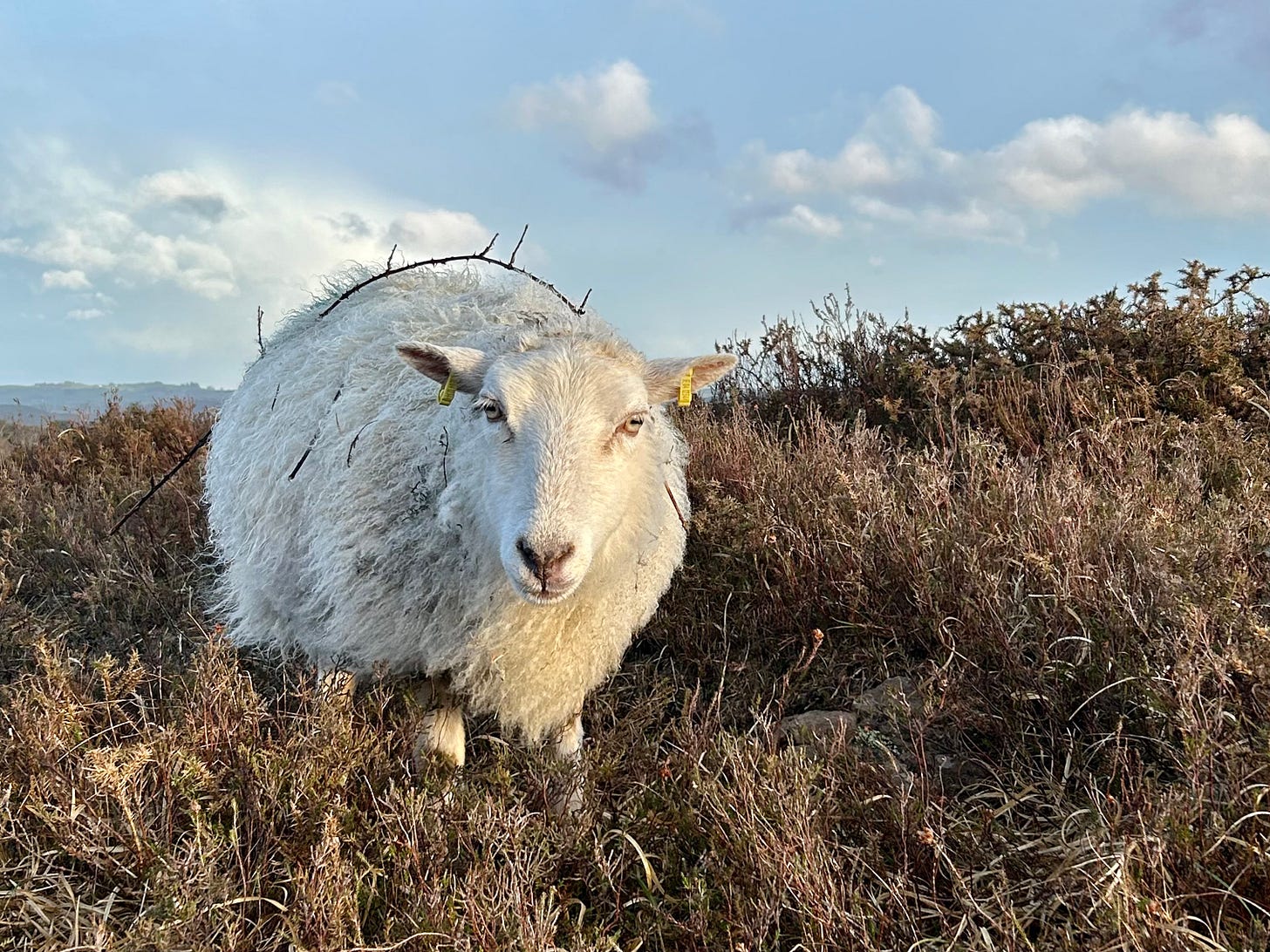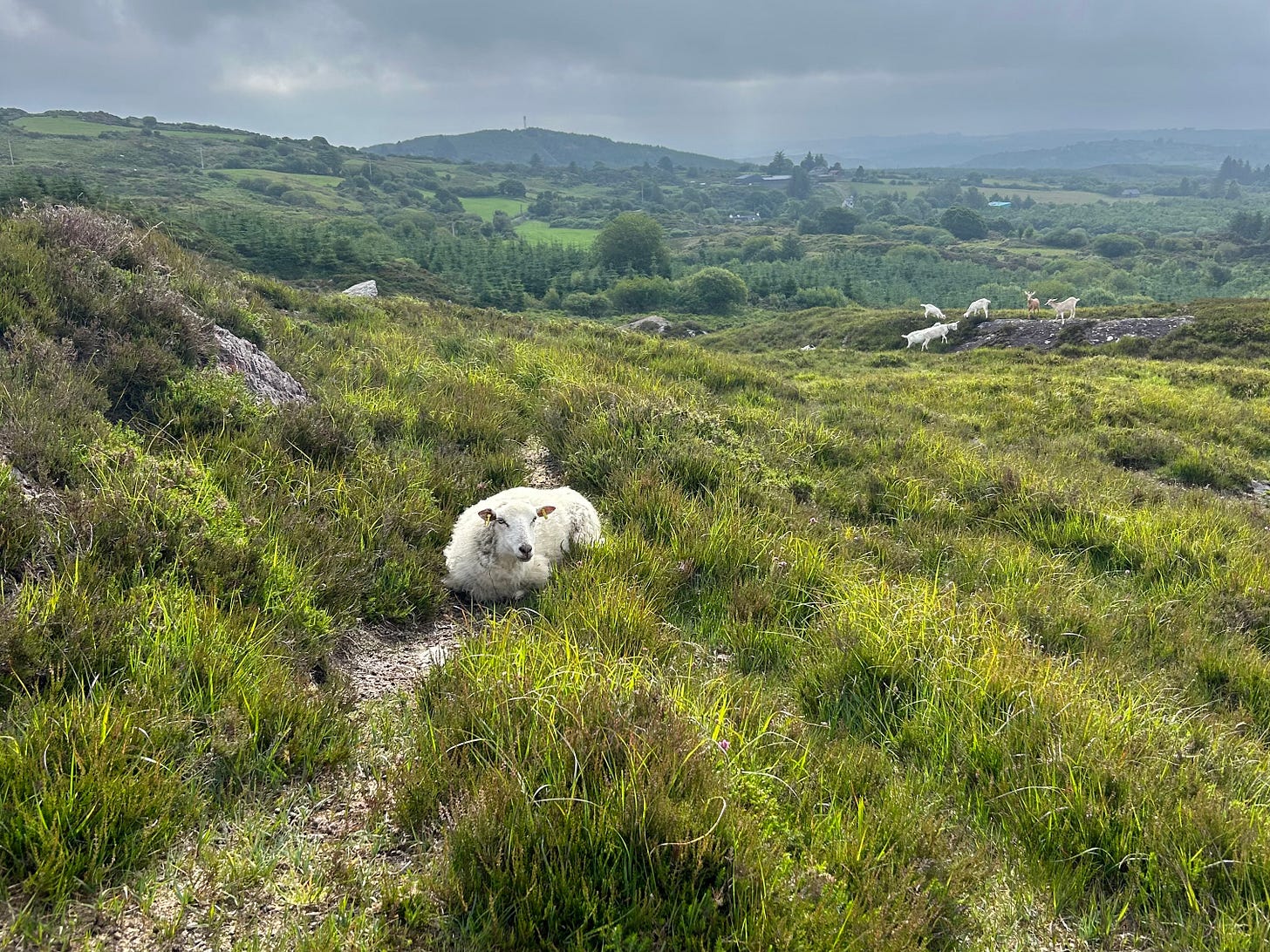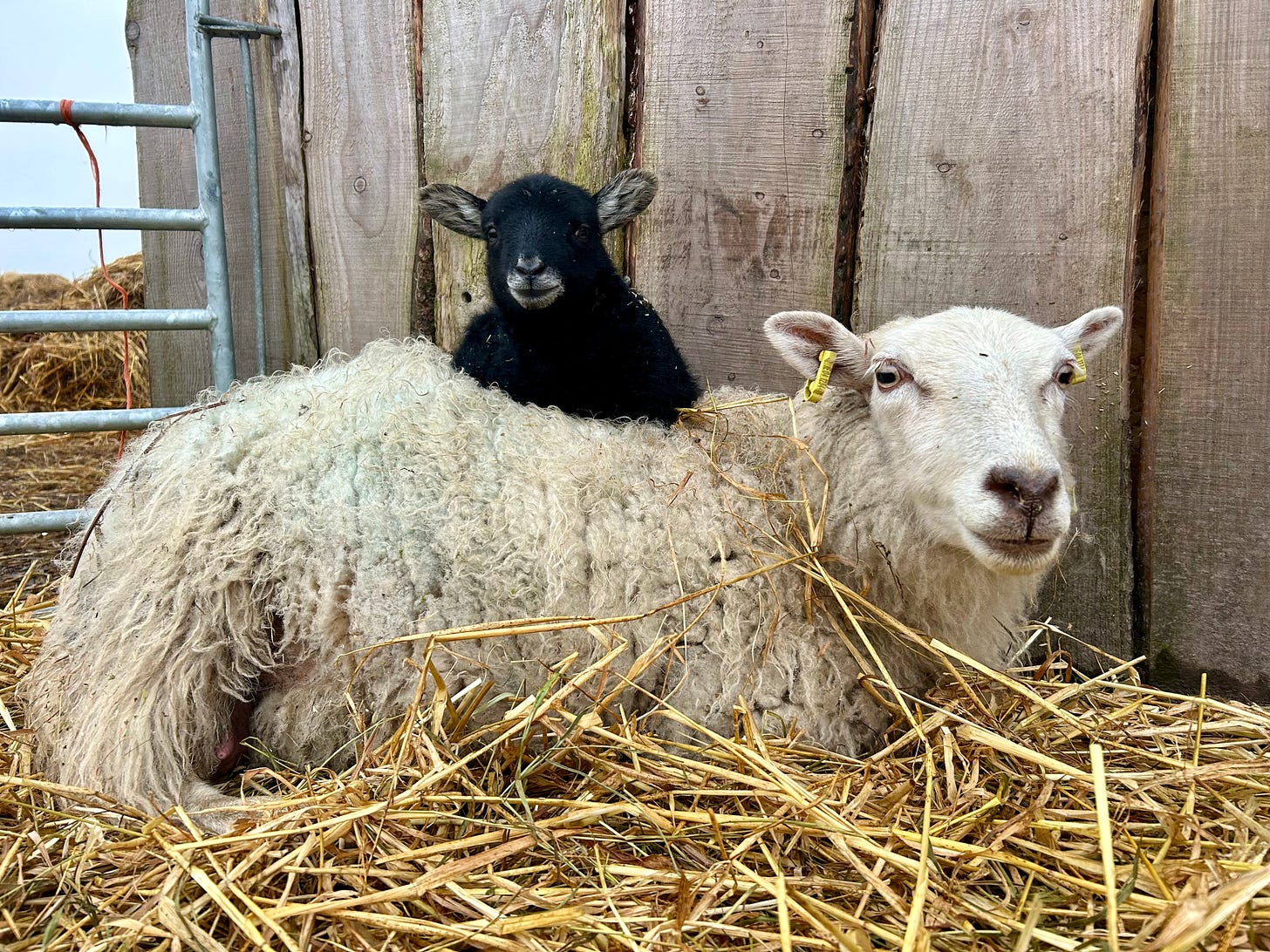Her name was Ursa. We called her ScattyPants. Or, slightly less politely, Scatty McPanicArse. One who wouldn’t be tamed. Couldn’t get near her without running the whole flock into a pen and she’d hedge outside the gate until all the others were in and then make a wide, running leap for it, dashing air-ways past the predatory human (me—if there were two of us in sight, not a hope) and into the safety of the flock. Always last to be caught, and always one who would scatter the flock at the first whiff of suspicious activity, but once caught, with the rush of endorphins that relaxes prey animals into a state of euphoria in the moment of impending death, she would melt like butter, soften into my hold like a rag doll. She reared a fine, strong lamb on the Hill each summer, never needed for anything, never gave any trouble. She was a good, reliable sheep, just as scatty as they come.
Her drive for life was admirable, even as the hunger weakened her. We let her live it out on the Hill—her home—for as long as she still had that drive in her, for as long as she still had a will to live and still doddered along at the back of the flock when they all came up for breakfast and nap time on the rocks. For as long as she still managed to chew a few strands of sunlight into soil. Until the flock began to ostracise her, to chase away her weakness, and her thin, frail little body could no longer carry itself up the rocky path to the feed trough to pick at a few crumbs and pretend to eat. They do that, you know, pretend to eat when they’re too sick or weak to take anything in. They try to look and behave normal, as though to hide their weakness. Maybe they’re just trying to eat but they really can’t. Then, while the flock were busy scoffing breakfast at the trough, we brought her last feed that she wouldn’t eat across the Hill to the dip in the heath where she lay. I placed the bucket in front of her nose and backed off to give her space as she stood, wobbled, and cautiously sniffed into her feed. Then I walked away.
The gunshot resounds across the Hill. Momentary silence. A pheasant shouts his alarm and the sounds of life pour in to fill the emptiness. Goats yell from the farmyard, oblivious to the finality of the gunshot, impatient to be let out onto the day’s forage. The day calls. Life keeps on living.
That was last week. I was going to go on into how we could have taken Ursa to the butcher as soon as we knew her mouth was broken (broken mouth is the term for a sheep whose teeth are giving way), gleaned a few slices of meat off her bones before she fell too thin and frail. About how every time we resolved ourselves to the task she would lower her nose and tuck in her sides, look as poor as she could, refuse to come up for feed and find some hole in the Hill to hide in as though to tell us she would rather die the way she lived, wild with the open Hill and give her skin and bones to feed the heather, than end up in the butcher’s yard. And about how death on the farm rolls into another day of living. But then I open my inbox to all the troubles of the world, all the politics and terror and grief of a burning world, and my little stories about life and death on the land feel trivial. Insensitive, ignorant, even, to write about a dying sheep and the mundane cyclicality of death on a farm when there are people dying and the world is being ripped apart. Who am I to keep living and writing about life as though everything is good and well in the world? Should I even be here anymore if I’m not writing about politics or prepping for survival? Or as Julia Skinner put it in this well timed piece on the layers of imposter syndrome, “Who am I to find joy when bombs are falling and everything is chaos?”
But there are enough voices telling those stories, taking it all apart and putting it all together and saying it all better than I can. My inbox is full of them. I have nothing to add to those conversations. I just want to write about goats and roses and cultivating a simple life of connection and community that runs counter to prevailing narratives of chaos and separation. And yes, about dying sheep because that’s part of it too. Making my comeback from a two month hiatus from Substack on the day the US went to war probably wasn’t my best move, but I couldn’t have foreseen that, not from my quiet little green corner of the world where no matter what’s going on out there in the wider world or right here on the heather under our feet, mother goats still demand to be milked and fed and their kids still dance and play for the simple joy of being alive, and failing sheep still dodder on, faithfully giving their compost and finally their blood and bones to feed the continuity of life.
Farms still have to feed people. Our farm may not feed very many people but it feeds us, it feeds the friends and neighbours we gift or trade eggs, meat and milk, it feeds soil, it feeds community, it feeds life. It keeps on living, and perhaps that is the simplest act of resistance in a world that wants to pull us apart. I cannot speak to all the grief in the world, but I can keep on faithfully feeding life.
The late summer softness—and the reason we grow grass and not grain crops in the southwest of Ireland—has arrived. The landscape is saturated in grey mist; green layered into grey. Rain so soft you barely feel it until it’s trickling down your brow and dripping from your hair. Grass grows thick and lush and heavy with the weight of rain, wellies and waterproofs are mandatory field wear despite the sweat running down your back and if you haven’t got your hay in yet, well, it’ll be wet silage instead. Moulds and fungi flourish. Rain so soft and persistent that it seeps between the layers of your skin, works its way through all your cracks and frazzled edges and you feel it meld you back together, plump you up like a ripening plum and soften all the sun-beaten lines in your brow. There is reassurance in the rain. The season rolling on in proper order, as it should be.




So beautiful I loved hearing about Ursa. If anything we need your writing, your way of life, your description of the simple everyday things, the sustenance you provide for others more then ever during times of chaos. A healing antidote to the madness xxx
Your writing struck such a deep chord with me. As a farmer myself, I know the heartbreak of losing animals, the way it never gets easier, no matter how many times you go through it. You captured the complexity so beautifully: the grief, the quiet dignity of letting go, the way life just keeps moving around you.
Thank you for putting words to something so many of us feel but rarely express. It reminded me that these small, tender stories are anything but trivial, they’re the thread of real life on the land.